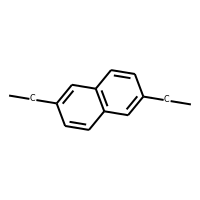
2,6-Diethylnaphthalene
| Predicted Absorption properties | |||
|---|---|---|---|
| Property | Tool | Interpretation | Probability/Value |
| Caco-2 permeability | admetSAR | Yes | - |
| pkCSM | High | 1.529 cm/s | |
| Human Intestinal Absorption | admetSAR | Yes | - |
| pkCSM | High | 94.653 % | |
| SwissADME | Low | - | |
| Human Oral Bioavailability | admetSAR | Yes | - |
| Log Kp (Skin permeation) | pkCSM | Low | -1.948 cm/h |
| SwissADME | - | -3.75 cm/s | |
| Predicted Distribution properties | |||
|---|---|---|---|
| Property | Tool | Interpretation | Probability/Value |
| P-glycoprotein substrate | admetSAR | No | - |
| pkCSM | No | - | |
| SwissADME | No | - | |
| vNN | No Prediction | - | |
| P-glycoprotein inhibitor | admetSAR | No | - |
| vNN | No Prediction | - | |
| P-glycoprotein inhibitor I | pkCSM | No | - |
| P-glycoprotein inhibitor II | pkCSM | No | - |
| Blood Brain Barrier | admetSAR | Yes | - |
| pkCSM | Yes | 0.579 logBB | |
| SwissADME | Yes | - | |
| vNN | No Prediction | - | |
| CNS permeability | pkCSM | Yes | -1.349 logPS |
| Fraction unbound in human | pkCSM | - | 0.024 |
| Plasma protein binding | admetSAR | 100% | 0.578 |
| Subcellular localization | admetSAR | Lysosomes | - |
| Steady state volume of distribution (VDss) | pkCSM | High | 0.937 L/Kg |
| Predicted Metabolism properties | |||
|---|---|---|---|
| Property | Tool | Interpretation | Probability/Value |
| CYP1A2 inhibitor | admetSAR | Yes | |
| pkCSM | Yes | - | |
| SwissADME | No | - | |
| vNN | No Prediction | - | |
| CYP2C19 inhibitor | admetSAR | No | - |
| pkCSM | Yes | - | |
| SwissADME | No | - | |
| vNN | No Prediction | - | |
| CYP2C9 inhibitor | admetSAR | No | - |
| pkCSM | Yes | - | |
| SwissADME | No | - | |
| vNN | No Prediction | - | |
| CYP2C9 substrate | admetSAR | No | - |
| CYP2D6 inhibitor | admetSAR | No | - |
| pkCSM | No | - | |
| SwissADME | Yes | - | |
| vNN | No Prediction | - | |
| CYP2D6 substrate | admetSAR | Yes | - |
| pkCSM | No | - | |
| CYP3A4 inhibitor | admetSAR | No | - |
| pkCSM | No | - | |
| SwissADME | No | - | |
| vNN | No | - | |
| CYP3A4 substrate | admetSAR | No | - |
| pkCSM | Yes | - | |
| CYP inhibitory promiscuity | admetSAR | Yes | - |
| Human Liver Microsomal (HLM) stability assay | vNN | No Prediction | - |
| OATP2B1 inhibitor | admetSAR | No | - |
| OATP1B1 inhibitor | admetSAR | Yes | - |
| OATP1B3 inhibitor | admetSAR | Yes | - |
| MATE1 inhibitor | admetSAR | 0.94 | - |
| BSEP inhibitor | admetSAR | Yes | - |
| UGT catalysis | admetSAR | No | - |
| Predicted Excretion properties | |||
|---|---|---|---|
| Property | Tool | Interpretation | Probability/Value |
| Renal OCT2 inhibitor | admetSAR | No | - |
| Renal OCT2 substrate | pkCSM | No | - |
| Total clearance | pkCSM | - | 0.25 ml/min/kg |
| Predicted Toxicity properties | ||||
|---|---|---|---|---|
| Property | Tool | Interpretation | Probability/Value | |
| Acute oral toxicity | admetSAR | - | 0.898 kg/mol | |
| Acute oral toxicity class | admetSAR | III | - | |
| Biodegradation | admetSAR | No | - | |
| Toxtree | Class 2 (persistent chemical) | - | ||
| Carcinogenicity (Three class) | admetSAR | Warning | - | |
| Carcinogens | admetSAR | No | - | |
| Toxtree | No | - | ||
| Cramer's rule | Toxtree | High (Class III) | - | |
| Cytotoxicity | vNN | No Prediction | - | |
| Genotoxic carcinogenity | Toxtree | No | - | |
| Hepatotoxicity | admetSAR | No | - | |
| pkCSM | No | - | ||
| vNN | No Prediction | - | ||
| Human Ether-a-go-go-Related Gene Inhibitor | admetSAR | Yes | ||
| vNN | No | - | ||
| Human Ether-a-go-go-Related Gene Inhibitor I | pkCSM | No | - | |
| Human Ether-a-go-go-Related Gene Inhibitor II | pkCSM | No | - | |
| Mitochondrial Membrane Potential (MMP) | vNN | No | - | |
| Maximum Recommended Tolerated Dose (MRTD) | pkCSM | High | 0.752 mg/kg/day | |
| vNN | - | 61 mg/day | ||
| Non-Genotoxic carcinogenicity | Toxtree | No | - | |
| Oral rat acute toxicity | pkCSM | - | 2.057 mol/kg (LD50) | |
| pkCSM | - | 1.25 mg/kg_bw/day (LOAEL) | ||
| Micronucleus | admetSAR | No | - | |
| Skin sensitisation | pkCSM | Yes | - | |